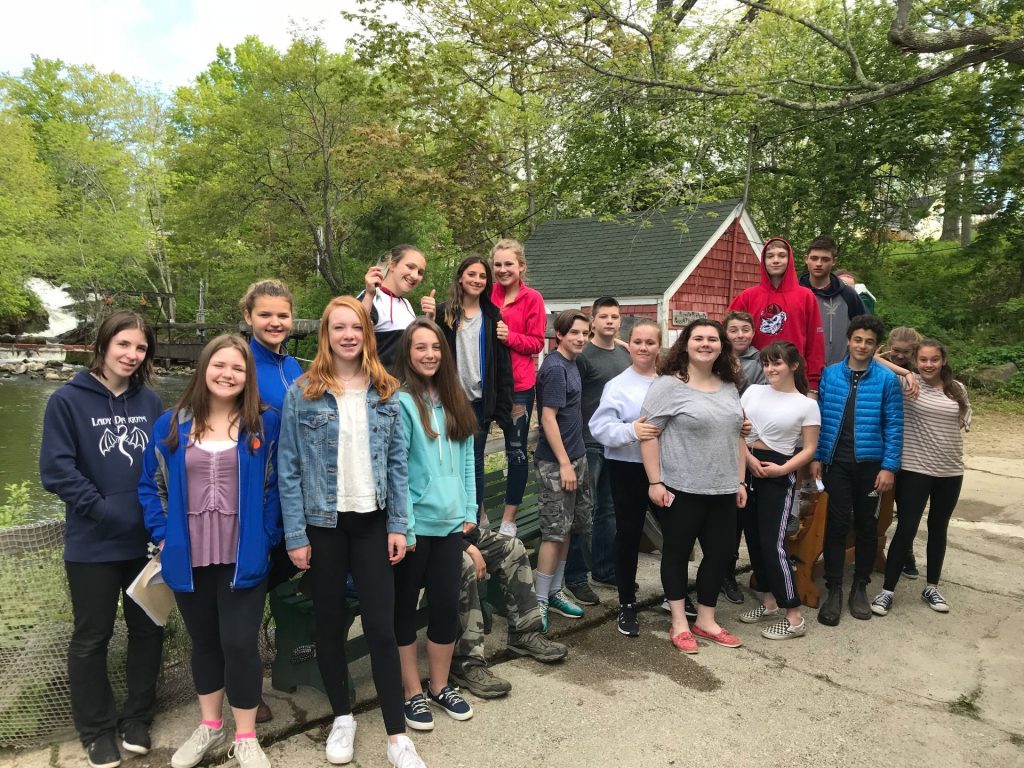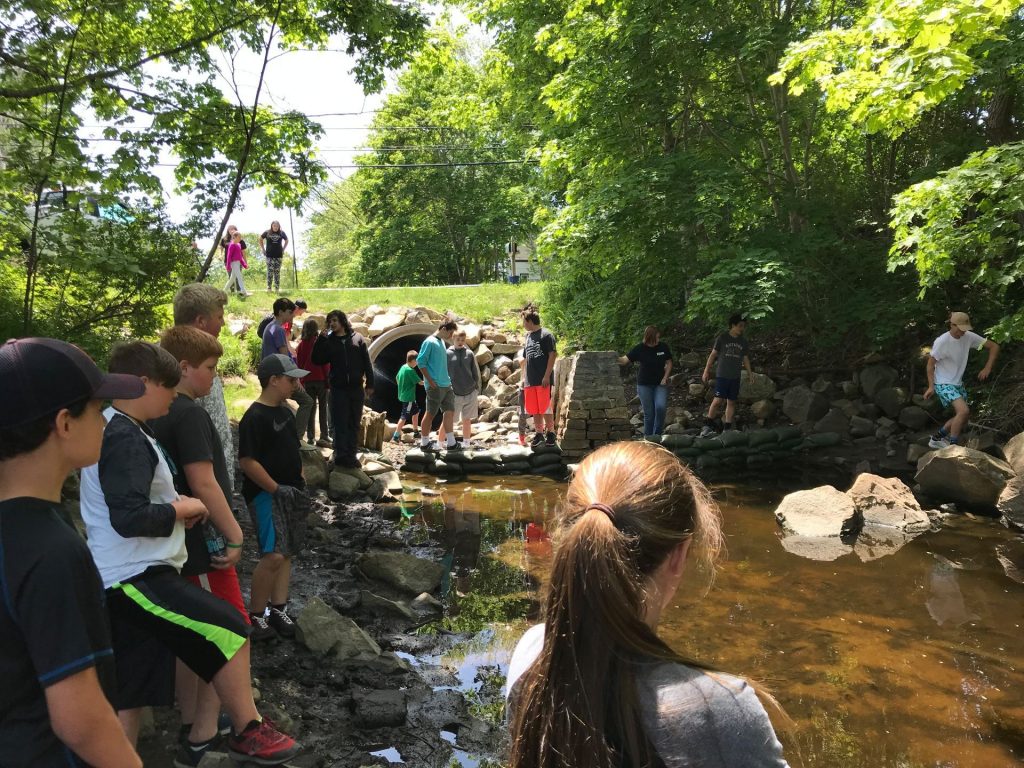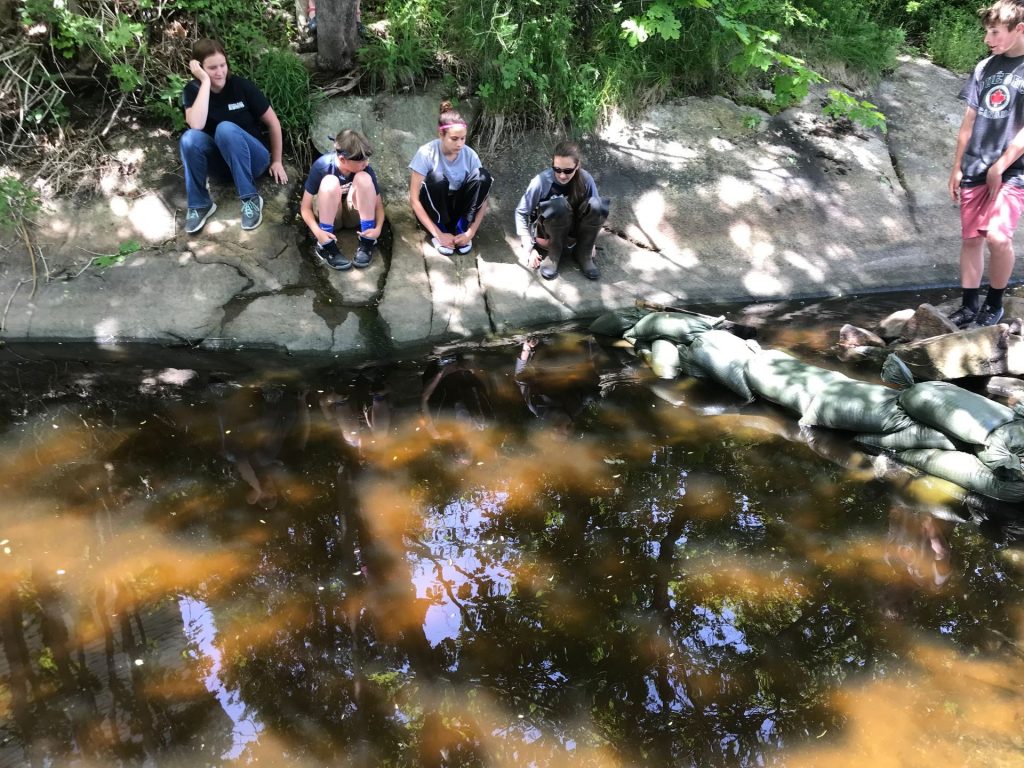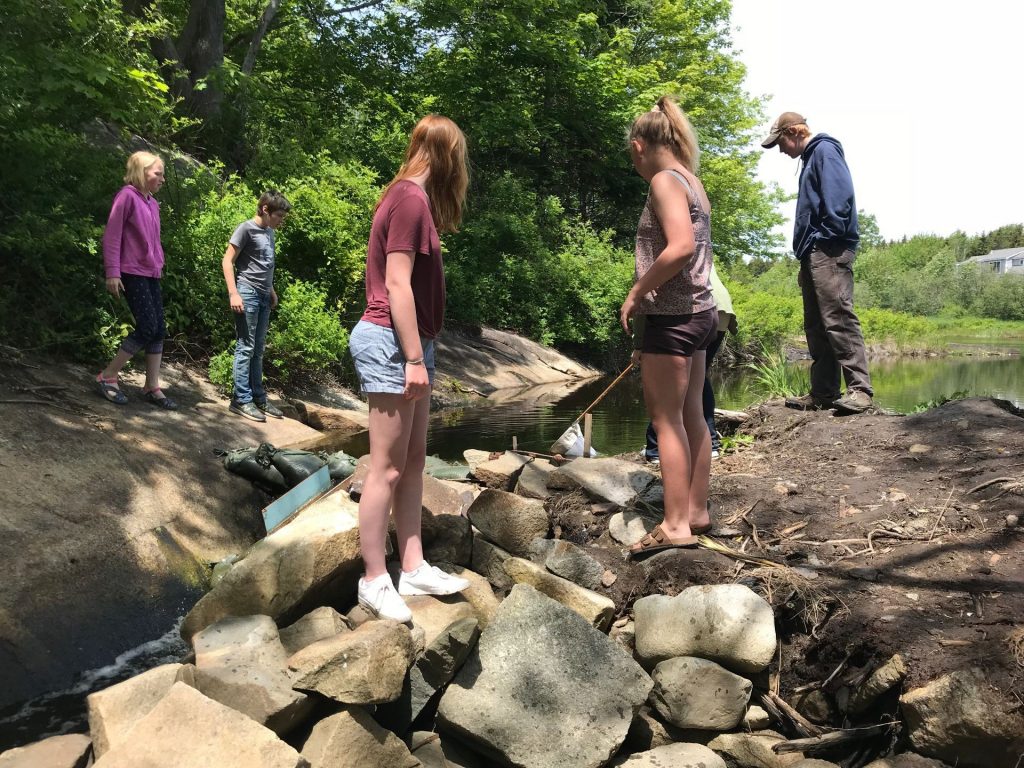

“This has been a really cool unit. I have loved learning about alewives and working together to bring their population back. In the future I want to go to an “Alewife Festival” with tons of alewives. Being back in the 1940’s-50’s with tons of alewives would be amazing. I have also learned how important these fish are for people and animals. Using the fish as bait when they are frozen, eating them, having queens for them, working in an alewife industry, all of those things could be wonderful. Now we have a chance to help the fish and our community. We grabbed that opportunity and it has been awesome.” Noelle Delano
“I think this project is important for our community and environment. It is important that people care, and are continuing the work of others as this lengthy project to bring back the alewives to our small town is still being continued. I think we have made a great difference in the short time we have been helping and assessing this problem. With the hard work everyone has put in, the alewives should come back, hopefully, soon.” Sophie Vigue
“This project has taught me a lot of information about alewives, the marsh, and our town. I have learned that the stream is affected by water level and tide pools. I also have learned that alewives can’t jump so they can’t get into the marsh. But I have learned the most about our town and how much they care about alewives. All and all this project has taught me how important alewives are to our town and ecosystem.” Parker Hilchey
“I would like to say a special thanks to Josh Miller for coming to our class to present; a special thanks to Ben Mathews for helping us understand the elevation differences and spending the day with us at the stream with his team; a special thanks to The Nature Conservancy team; a special thanks to all of my middle level teachers for being understanding for the time that we came to class late because we were at the stream, for the times that we would go in to class soaked, barefoot or smelling like swamp water; and the biggest thanks to Mrs. England because she has helped me and all of my classmates persevere through this project, and has made a big effort for me and my peers!” Cassi Evans
“During this project I learned how to make a difference by applying science and math to a real world problem. This unit was a great way of community service, and giving back to the place we love. I especially liked the physical part of this project, being outside and hands-on with my work. My family has been in the fishing industry for over 200 years, and being able to learn and help them in our work was a great experience. I have always been interested in marine biology and engineering, so I think this project was extremely exciting and interesting. I plan on doing more work like this later in life. This project was a great jumpstart to what is next.” Ahlivia Morris
“Personally, at first I didn’t see how the project was important or why I was taking time out of my life to do it. But now I realize that by going down and working in the outlet stream – which I actually found fun – I am aiding a community in a project that people have been working on and spending money on for years upon years. Applying what I’ve learned to the work in the outlet stream has proved useful, and later in life when I look back at the work I’ve done here, I think I’ll realize how I helped get an important project moving.” Tucker Adams
“This project is important, because it will help lead the way to increasing the alewife population. Our class’s suggestion to create pools will hopefully help the alewives get into the marsh. This project has taught me how to effectively help the ecosystem. I got to help preserve our resources, history, and culture, just by walking down the road to the Marsh.” Anna Kingsbury
“Alewives bring the St. George community members together and help create new friendships. We have John Shea to thank for that. John Shea was the man responsible for getting the state to stock the marsh. Without him we would never have had any alewives in St.George Marsh. It’s easy to notice that alewives do matter not only for the lobsterman but for community members as well. Some might say “no alewives in the St. George Marsh is like having no chocolate in a Chocolate Factory”. In other words if St. George didn’t have alewives we’d just be another town in Maine. Just like if a Chocolate Factory didn’t have any chocolate, it would just be another store.” Audrey Leavitt
“I will always remember significance alewives have on the St. George Community and myself. I have enjoyed working with community members such as Lyle Morris and Josh Miller. And as for me, I have generated a newfound knowledge regarding alewives in St. George and throughout Maine.” Audrey Leavitt
“Most of the time when we were doing this project, I thought our efforts were useless, and would be ineffective for the return of the alewives. After all, classes before us had tried and failed at restoring them. I honestly don’t think they will ever return, but I do think this project not only brought us a little closer to our community, but also taught us about features that fish and other animals need to live.” Allison Gill
“From the time I was a part of this project I realized the history and importance it had. St. George was/is known pretty well for their fishing industries and really looking and learning deep into where it first started was an awesome experience.” Justyce Long
“Our class was very fortunate to be a part of this expedition. I was excited to hear that we are going to learn about alewives. I realized throughout this project, how much alewives mean to this town. I am proud to hand down this expedition to the upcoming 8th graders.” Liam O’Neil
“Since this project started in February we have done a lot of research to prepare for our final proposition. We began by just going down to the stream and observing the streamflow. We had visits from local lobstermen, and people from the nature conservancy, who helped us understand the issue more wholly, as well as showing us why people cared. We took a day to go and visit the Damariscotta alewive run, which gave us visual examples of what we needed to do to make the passage better for the fish in our stream. I will never forget the work we did this year, and I’m glad that we got involved with an issue that actually mattered.” Jackson Fitch
“All year we have been going down to the marsh when the weather was nice and working out a way to get the alewives back in Saint George. The 8th graders have been working down at the marsh for the past two. Two years ago it was to measure the stream flow, this year it is to make a fish ladder so that we can have at least a small run in Saint George again. The return of alewives is very important because alewives are prey to most wildlife and without them our ecosystem would change so that nothing would be the same. Even our daily lives would change, believe it or not. Every day we see ducks and seagulls; without fish to eat they would go away. If we continue to help the alewives we could have some bait for the lobstermen so they don’t have to go to Damariscotta or farther for bait, Also, we could see even more wildlife around town, and it would bring the community together. Even though the kids of Saint George might only be a small part of the community we can make a big difference.” Victoria Balla
Mrs. England, speaking to the 8th grade class at the end of the year ceremony:
“Suddenly, it seems like the days, the weeks, and the years have zipped by and here we are. I couldn’t have scripted a better way to complete the time we’ve shared than to cap it off with returning alewives after you’ve worked to restore their passage. What makes it special is not just the fish themselves; it’s the story you learned about your community history, about John Shea’s leadership to get the restocking of fish, and it’s about how you have recognized that natural resources can be cultural resources as well; they can bring people together.
You’ve each contributed in different ways, and I’m so happy that many of you could see the meaning of your work, in the most fundamental way, observing the fish on Tuesday, while they swam in and out of sunlit patches, all of us looking on from the banks, with quiet anticipation. I’ll never forget it.
So my message to each of you is to believe in your effort and believe in yourselves; You have made a difference here and now you are a part of the story.”





